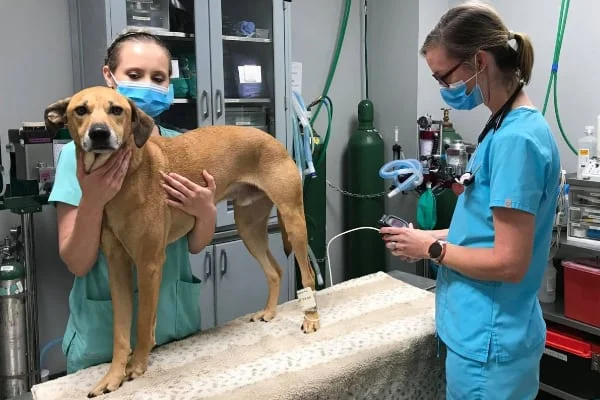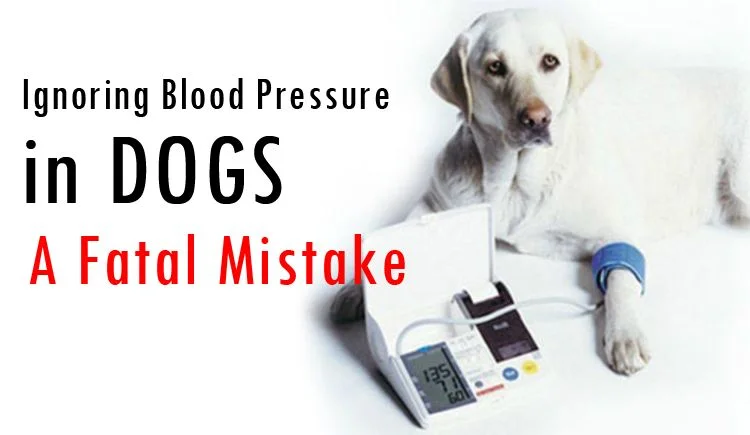Before we discuss High Blood Pressure in Dogs, let’s explore what exactly is blood pressure.
Blood pressure is the pressure on the walls of the arteries when the heart contracts and empties, as well as when the heart relaxes and fills with blood.
When the heart contracts, it is called systole, and “systolic pressure” is the maximum pressure against the walls of the arteries.
Table of Contents
When the heart relaxes, this is called diastole and the minimum pressure on the arterial walls is “diastolic pressure”.
Constant elevation of systolic pressure of 140mmHg or a higher, diastolic pressure of 90mmHg or higher describes high blood pressure throughout the body, called “Systemic hypertension”.
You may have an idea about hypertension in humans. However, you may not realize that dogs also suffer from high blood pressure.

Most dog owners agree that there is a lack of knowledge or concern about canine hypertension or high blood pressure in dogs.
Blood pressure in dogs did not receive the same attention.
Veterinarians record pet blood pressure as a systolic measure.
High Blood pressure in dogs is often caused by an underlying disease and in this case, it is called “secondary hypertension”.
If no underlying disease is present or undiagnosed, it is called “primary hypertension”.
Blood pressure and older dogs
If small dogs have kidney disease due to infection (such as leptospirosis) or kidney abnormalities, high blood pressure can occur.

Blood pressure is diagnosed by measuring blood pressure using a similar technique used on humans.
Older dogs are more prone to issues related to high blood pressure (hypertension) due to a variety of factors, including age-related changes in their bodies and the accumulation of underlying health conditions. Here, we’ll explore some scenarios in which older dogs are particularly susceptible to hypertension-related problems and provide real-life instances to illustrate these challenges.
Age-Related Physiological Changes
Just like in humans, as dogs age, their blood vessels lose some of their elasticity, making them more susceptible to high blood pressure. This natural aging process can contribute to hypertension in older dogs.
Real-life scenario: Meet Bella, a 10-year-old Labrador Retriever. Bella’s owner, Sarah, noticed that Bella’s energy levels had decreased, and she seemed disoriented at times. During a routine veterinary check-up, it was discovered that Bella had developed high blood pressure due to age-related changes. Her vet prescribed medication to manage her hypertension and recommended regular monitoring.
Preexisting Health Conditions
Older dogs often have preexisting health issues like kidney disease, diabetes, or heart problems. These conditions can increase the risk of hypertension and exacerbate its effects.
Real-life scenario: Max, an 12-year-old Schnauzer, had been living with diabetes for several years. His owner, David, noticed Max seemed more lethargic than usual and had difficulty seeing. A visit to the vet revealed that Max’s diabetes had led to high blood pressure, which had, in turn, caused retinal damage. Max required both diabetes and hypertension management to improve his quality of life.
Medication Side Effects
Some medications commonly prescribed to older dogs, such as steroids, can increase blood pressure as a side effect. Older dogs on long-term medication regimens may face an elevated risk of hypertension.
Real-life scenario: Daisy, a 14-year-old mixed breed, had been taking steroids for arthritis. Over time, her owner, Tom, noticed that Daisy was panting excessively and seemed restless. A visit to the vet confirmed that the steroids had caused an increase in Daisy’s blood pressure. Adjustments to her medication and regular monitoring helped manage her hypertension.
Weight and Diet
Older dogs may be more prone to weight gain, which can exacerbate hypertension. Dietary choices can also play a role in blood pressure regulation.
Real-life scenario: Toby, a 9-year-old Dachshund, had gained some extra pounds in his senior years. His owner, Maria, noticed that Toby was having difficulty breathing and had a persistent cough. After consulting with the vet, they discovered that Toby’s weight gain had contributed to his high blood pressure, which was affecting his heart and causing the cough. Adjusting Toby’s diet and exercise routine helped him shed the extra weight and manage his hypertension.
In these real-life scenarios, older dogs face various challenges related to high blood pressure, from age-related changes to the interaction of preexisting health conditions and medications. Regular veterinary check-ups and close monitoring are essential for identifying hypertension in older dogs early and implementing appropriate interventions to enhance their quality of life. Additionally, maintaining a healthy lifestyle through proper diet and exercise can help mitigate the risk of hypertension in aging canine companions.
Also Read: How to Take Care of Newborn German Shepherd Puppies and Mother
Normal Dog Blood Pressure | Age Wise
Blood pressure in dogs can vary depending on their age, size, and overall health. While there isn’t a single set of “normal” blood pressure values for all dogs, here’s a general guideline for normal blood pressure ranges in dogs across different age groups:
| Age Group | Systolic Pressure (mm Hg) | Diastolic Pressure (mm Hg) |
|---|---|---|
| 3 months – 1 year | 90 – 120 | 50 – 80 |
| 1 – 3 years | 90 – 140 | 60 – 90 |
| 3 – 6 years | 90 – 140 | 60 – 90 |
| 6 – 9 years | 100 – 160 | 70 – 100 |
| 9 – 10 years+ | 100 – 160 | 70 – 100 |
Please note that these are approximate ranges, and individual dogs may have slightly different values. It’s crucial to consider the dog’s breed, size, and any underlying health conditions when assessing blood pressure. Additionally, regular check-ups with a veterinarian can help monitor a dog’s blood pressure and detect any abnormalities or changes over time. If you suspect your dog may have high or low blood pressure, consult with your veterinarian for a proper evaluation and guidance.
What causes Hypertension in dogs?
- The cause of primary hypertension is unknown.
- Secondary hypertension causes high blood pressure in dogs and can be caused by kidney disease, adrenal gland disease, diabetes mellitus (less common), pheochromocytoma (adrenal gland tumor and very abnormal), or central nervous system disease (very rare).
- Read the food label (know the ingredients) before feeding your dog.
- Sodium and potassium play important role in blood pressure control in humans and in animals. However, the extent of the salt limit is still under investigation.
- Nutrition is a direct cause of many conditions that can cause high blood pressure, however, a high-fat diet can lead to obesity, which can further lead to high blood pressure.
Symptoms of High Blood Pressure In Dogs

Symptoms of hypertension can be
- Sudden blindness
- bleeding within the globe of the eye
- Detached retinas
- Nervous system signs include depression, dizziness, seizures, confusion, motionless or coordinated movements (called “ataxia”), circulatory, weakness or partial paralysis, or short, rapid, posterior, and posterior movements of the eyes (called “nystagmus”). )
- Increased thirst and urinary incontinence increased with the progression of chronic kidney disease
- Blood in the urine (called “hematuria“)
- Bleeding in the nose and nasal passages (called “epistaxis” or nasal congestion)
- Heart murmur or abnormal heart rhythms
Managing High Blood Pressure in Dogs
Treating your dog’s high blood pressure depends on what’s causing it.
- For dogs with hereditary high blood pressure, which is rare, you can make a difference with diet changes and more playtime. If these lifestyle changes don’t work, your vet might give your dog medicine.
- Dogs with secondary hypertension will usually get treatment for the main problem causing their high blood pressure, not just the high blood pressure itself. Sometimes, though, your vet might also prescribe medicine to help with the blood pressure.
Sometimes, high blood pressure in dogs doesn’t show obvious signs at first. That’s why it’s vital to keep up with regular vet visits, especially if you notice anything unusual in your dog’s behavior or health. Your vet can catch and manage high blood pressure early to keep your furry friend healthy.

- If the dog develops a serious problem related to blood pressure, such as severe kidney failure or bleeding in the eye, hospitalization is required.
- An important part of long-term management can be therapeutic nutrition.
- After treatment, the animals often resolve their hypertensive problems.
- Periodic laboratory testing is required to monitor the side effects of the medication and the progression of the disease.
Possible complications of Hypertension in dogs
Hypertension, or high blood pressure, in dogs, can lead to several serious complications that affect their overall health and well-being. Here are some of the key complications associated with hypertension in dogs:
- Circulatory Heart Failure: High blood pressure can put excessive strain on your dog’s heart. Over time, this strain can lead to circulatory heart failure, where the heart struggles to pump blood effectively. This condition can result in symptoms like coughing, difficulty breathing, and fluid retention in the abdomen and legs.
- Chronic Kidney Disease: Hypertension can damage the delicate blood vessels in the kidneys, reducing their ability to filter waste and maintain proper electrolyte balance. This can eventually lead to chronic kidney disease (CKD), a progressive and potentially life-threatening condition.
- Retinal Degeneration and Blindness: Elevated blood pressure can harm the blood vessels in the eyes, leading to retinal degeneration. This condition can cause vision problems and, in severe cases, lead to blindness. Regular eye examinations are crucial for dogs with hypertension to monitor their eye health.
- Bleeding into the Eye: High blood pressure can increase the risk of bleeding into the eye, a condition known as hypertensive retinopathy. This can result in sudden vision changes, eye pain, and discomfort for your dog.
- Stroke (Cerebral Vascular Accident): Hypertension can damage the blood vessels in the brain, increasing the risk of a stroke or cerebral vascular accident (CVA). Strokes in dogs can lead to various neurological symptoms, including weakness, disorientation, and seizures.
It’s essential to recognize that hypertension in dogs often doesn’t show noticeable symptoms until it has already caused significant damage. Regular veterinary check-ups are vital for early detection and management of high blood pressure in dogs, especially if your pet is at risk due to age, breed, or other underlying health conditions. Early intervention and appropriate treatment can help prevent or mitigate these potentially severe complications and ensure your furry companion enjoys a healthy and happy life.

